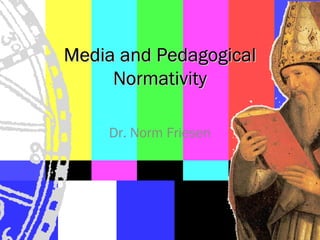
Normativity and media1
- 1. Media and Pedagogical Normativity Dr. Norm Friesen
- 2. Overview • Media = “talk and action,” reading & writing, technical media • Normativity = performance standards & the “common good” affirmed in Bildung • Two traditions: – Media as neutral, particularly inside the classroom – Media as constitutive of the good and values of education from the start
- 3. [I] did myself, by the understanding which Thou, my God, gavest me, practice the sounds in my memory. Then they named anything, and as they spoke turned towards it, I saw and remembered that they called what they would point out by the name they uttered.... By repeatedly hearing words in particular positions in various sentences, I gradually learned which things the various words stood for; and having acclimated my mouth to these signs, I thereby gave utterance to my will.
- 6. be clear, and by that, firm and solid, if whatever is taught and learned, be not obscure, or confused, but apparent, distinct, and articulate, as the fingers on the hands. The ground of this business, is that sensual objects may be rightly presented to the senses, for fear they may not be received.
- 7. I say, and say it again aloud, that this last is the foundation of all the rest: because we can neither act nor speak wisely, unless we first rightly under- stand all the things which are to be done, and whereof we are to speak.
- 14. • Modality principle: People learn better from animation and narration than from animation and on-screen text. • Redundancy principle: People learn better from animation and narration than from animation, narration, and on-screen text. • Coherence principle: People learn better when extraneous words, pictures, and sounds are excluded rather than included. • Spatial contiguity principle: People learn better when corresponding words and pictures are presented near rather than far from each other on the page or screen.
- 15. writing is inferior to speech. For it is like a picture, which can give no answer to a question, and has only a deceitful likeness of a living creature. It has no power of adaptation, but uses the same words for all. It is not a legitimate son of knowledge, but a bastard, and when an attack is made upon this bastard neither parent nor anyone else is there to defend it. The husbandman will not seriously incline to sow his seed in such a hot–bed or garden of Adonis; he will rather sow in the natural soil of the human soul which has depth of earth
- 16. three ways of writing correspond almost exactly to three different stages according to which one can consider men gathered into a nation. The depicting of objects is appropriate to a savage people; signs of words and of propositions, to a barbaric people; and the alphabet to civilized people. (1966, 17)
- 17. for 2500 years the philosophers of the Western world have excluded all technology from the matter-form in entelechy treatment. Innis spent much of his life trying to explain how Greek culture had been destroyed by writing and its effects on their oral tradition. Innis also spent much of his life trying to draw attention to the psychic and social consequences of technologies. It did not occur to him that our philosophy systematically excludes t e c h n e from its meditations. Only natural and living forms are classified as hylo-morphic. (Letters)
- 18. …the ground rules according to which reality is constructed for children are not simply changed; instead, a whole new system of rules emerges. Culture is no longer presented to the child as a seamless whole, but only in part. The part that is presented is offered through a kind of pedagogical rehearsal or practice, as it would be for someone from a foreign land. … the realm of schooling consists of a huge montage of images and representations which are not “the things themselves” but that instead “point out” things and phenomena. Our educational system would descend into chaos if our schools were suddenly emptied of …all educational [images and illustrations,] all “academic subjects” and textbooks – including forms of representation such as this book. This [constitutes the] massive arsenal of educational contents, methods and aims, through which modern educational practice has evolved.
